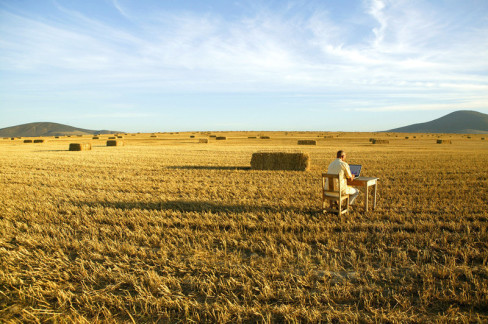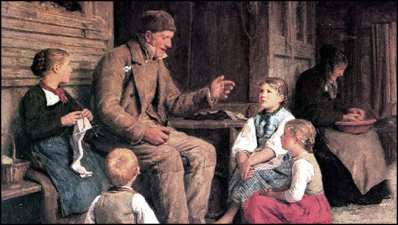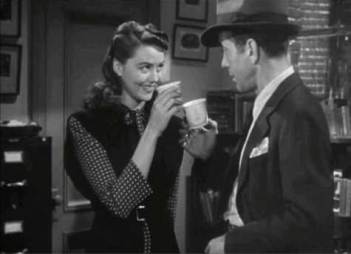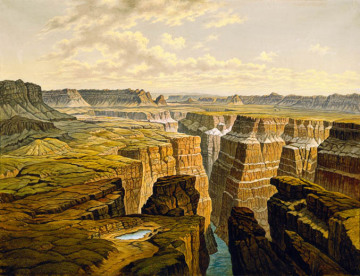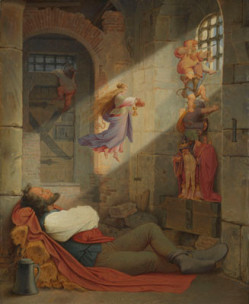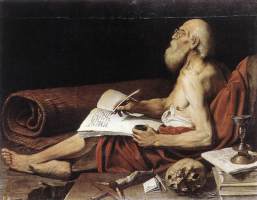On Writing
Why We Need Story
By Steven D. Malone
Once upon a time, a dark and stormy story voiced. I listened.
Many stories actually. My soul filled with them. The walls and shelves groaned under the burden of their weight.
Once, in my immeasurably misspent youth, I hitchhiked home from San Francisco to Houston, Texas carrying 30 pounds of boxed books alongside a duffle and a backpack. I would have ditched the duffle before I let go the books.
I carried this weight because I need story. Always have. Always will.
I’m not alone in this I think. You need story. We all need story.
This need birthed itself, in a which-came-first-the-chicken-or-the-egg way, the day the first Pleistocene caveman lied to his hungry family about the big one that got away. With appropriate embellishments, of course.
“If you’re going to have a story, have a big story, or none at all.” – Joseph Campbell
Somehow, story making and telling is wired into our very brain. Right alongside the mind’s ability to use language. Like a sort of Language 2.0. A “meta-grammar”, if you will. Our minds may be a “story processor, not a logic processer” – says Jonathan Haidt. And story hugely profits our species.
We might not recall facts, but story has a way of embedding into our minds and remaining with a tenacity only rivaled by music. – Kristen Lamb
In my heart I feel that telling and listening is just plain fun. There need be no other purpose. However, I find that way too many experts tell me that it has other, more profound, purposes.
Storytelling gives our species a leg up on the food chain scale. By itself, the ability to tell stories may be an evolutionary step separating us from other animals. It’s damn useful.
It can tell us how our world works. It shows us valuable information on tool making and use. How to bag the big game. How to make fire. How to hide from the lion. It tells us about our tribe, the history of its heroes, and how our tribe is better than other tribes. Story unifies us, reaffirming tribal truths and strengths. What better ways are there to account for the triumphs of our tribe?
Laura McGuire, https://www.philosophytalk.org/blog/evolution-storytelling, speculates that stories help us avoid our troubles by allowing us to enter imaginary worlds. To relax and escape our reality. And, maybe, it gives us an advantage in finding a mate. Tell a good story, hold another person’s attention, and seduce them with our words.” (I like that last one especially.)
She reinforces the idea that our mythologies and histories, shared, provide pooled resources that make the group stronger.
They tell me what we do and how we live and occasionally, if I’m lucky, they tell me why. There is a commonality to stories that makes us whole beings…” - Pete Sleeth
So, what is a story?
Piper Hendricks says: A story is “a character-based narration of a character’s struggles to overcome obstacles and reach an important goal. Stories convey values. In each of the five stages of a well-told story different chemicals are released. A “well-told” story is one that reaches your audience. You will only reach your audience and transport them into the world of your character if they relate to the character. A good story conveys values, emotion, action and creativity.
Well, I think he overstated what a story is. A little anyway. Something got skipped as well. What, to me, was left out was that a story “reaches your audience” because it entertains. It’s fun. That’s the way those chemicals get released.
Empathy.
A reader, a listener, needs to insert him or herself into the character. To hear Genesis, one must taste that apple. In The Lord of the Rings, you must feel the weight of the ring.
We humans, I believe, are addicted to vicarious living through tales told or read. Through all the eons, our species struggled through situations we must decipher or escape. This struggle, in times of rest, leaves us with a yearning. It does not let go. An itch that needs to be scratched.
We want more. In the dark of our cave, before the flicker of the hearth fire (or the TV), we seek more. We reach to open a book. We grab the remote. We yearn to relive (vicariously) the adventure of our lives.
Open a book you crazy guys. We need it. Scratch. And, maybe, live happily ever after.
The Mystery of Mysteries
By Steven D. Malone
The criminal is the creative artist; the detective only the critic. ― G.K. Chesterton
Because I’m writing a series of sleuth novels, I thought I’d take a gander at what some of those writers thought about their sleuth stories, and their art.
Most interesting, as it turns out: Writing is still writing.
I write historical fiction and historical fantasy. But an accident put me onto Dashiell Hammett and from there onto Raymond Chandler. The dam burst, and I was off writing a mystery. A historical mystery but a mystery.
As with most writers, I turned to google, bing, and firefox. Inquiring minds do want to know. There’s a lot out there. Most of us are generous and eager to share the mechanics of our art. It turns out that classic mystery writers are/were as well.
We can find good rules of thumb, formulas, and guidelines. Heck, I even found a number of mystery plot generators.
Our task as sleuth writers is to make our readers hear, feel, and above all, see. That is all and that is everything. — Joseph Conrad
I learned to try first person POV. Something I’d never done before. This lets the reader live vicariously through the narrator and be closer to him. Even makes the action keener felt. First person can allow your protagonist to be naive, especially in his or her first cases. However, naive is okay. Stupid? Never. Readers will not like dumb or inane. That probably goes for antagonists. Antagonists can overlook something that ends up with them catching themselves but the protagonist needs to end up noticing.
It’s always good to throw in some romance. These days it’s expected. Try for the unexpected twist or the unpredictable liaison. Too often a pairing has been done to death. Make it fun. Make it spicy.
Sidekicks are good. They are friends and foils. They prevent the hero from getting too full of him or herself. Or, the opposite, they can prop up the hero in difficult times. They can offer different perspectives. They can watch the hero’s back.
Throw in some action. Sleuthing is a dangerous business. Murderers do not like being hunted or caught. They are not nice people—generally. Who knows, maybe our antagonists have mitigating circumstances and it’s a sad day when they’re caught.
The best advice I found was “make it believable.” It is essential that your sleuth is involved for more than idle curiosity. Give strong reasons for the hero to be tenacious—especially when facing danger. As a murderer has motive for the crime, the sleuth must have motivation for getting to the solution.
Now for the masters:
I chose to have them comment on; being a writer, plot, tension and conflict, characterization, and style. It’s a bit of a hodgepodge and I will not attribute all of their comments for the sake of length.
That said, the authors I studied include the following: Raymond Chandler, Jim Thompson, George V. Higgins, William Bernhardt, Ross MacDonald, PD James, John Le Carre, Patricia Cornwell, Sue Grafton, Joseph Conrad, Arthur Conan Doyle, Catherine Louisa Pirkis, Georges Simenon, Janet Evanovich, and Ellis Peters.
For all of you considering such stories, researching these writers will be fun and well worth your time. Get at it.
The Writer:
Writing doesn’t get easier. Every novel is a first novel. (John Le Carre)
We all need to look into the dark side of our nature—that’s where the energy is, the passion. People are afraid of that because it holds pieces of us we’re busy denying. (Sue Grafton)
The faster one writes the greater the output. Besides, going slow means trouble. You might be pushing your words instead of being led by them. (Raymond Chandler)
As a man writes his fiction, his fiction is writing him. We can never change ourselves back into what we were, any more than I can change these printed words. So we have to be careful about what we write. (Ross MacDonald)
Open your mind to new experiences, particularly to the study of other people. Nothing that happens to a writer—however happy, however tragic—is ever wasted. And, write what you need to write, not what is currently popular or what you think will sell. (PD James)
If you do not seek to publish what you have written, then you are not a writer and you never will be. (George V. Higgins)
I am not the law, but I represent justice so far as my feeble powers go. (George V. Higgins)
I suppose I shall have to compound a felony, as usual. (Arthur Conan Doyle)
Plot:
There is nothing like shooting a man while he's down. (Patricia Cornwell)
A good plot was one which made good scenes. A good story cannot be devised; it has to be distilled. (Raymond Chandler)
There are thirty-two ways to write a story, and I’ve used every one, but there is only one plot—things are not as they seem. (Jim Thompson)
I see plot as a vehicle of meaning. It should be as complex as contemporary life, but balanced enough to say true things about it. The surprise with which a detective novel concludes should set up tragic vibrations which run backward through the entire structure. Which means that the structure must be single, and intended. (Ross MacDonald)
It has long been an axiom of mine that the little things are infinitely the most important. (Arthur Conan Doyle)
Tension & Conflict:
Competing egos, status struggles, clashes of styles and personalities—this is the stuff conflict thrives upon. (William Bernhardt)
We all need to look into the dark side of our nature—that’s where the energy is, the passion. People are afraid of that because it holds pieces of us we’re busy denying. (Sue Grafton)
Murder is murder, as much a curse to the slayer as to the slain, and cannot be a matter of indifference, whoever the dead may be. (Ellis Peters)
The only thing better than getting away with doing a crime was to get someone else convicted for having done it. (Dick Francis)
Now is the dramatic moment of fate, Watson, when you hear a step upon the stair which is walking into your life, and you know not whether for good or ill. (Arthur Conan Doyle)
Violence does, in truth, recoil upon the violent, and the schemer falls into the pit which he digs for another. (Arthur Conan Doyle)
Jealousy is a strange transformer of characters. (Arthur Conan Doyle)
Characterization:
Men drive off bridges and drink too much because of women like you. (Janet Evanovich)
Too much virtue has a corrupting effect. (Sue Grafton)
Pretty was hardly the word. With her fierce curled lips, black eyes and clean angry bones she must have stood out in her graduating class like a chicken hawk in a flock of pullets. (Ross MacDonald)
“Character determines action,” she said, slowly, at last. “That is the secret of the great novelists.” They put themselves behind and within their characters, and so make us feel that every act of their personages is not only natural but even — given the conditions — inevitable. (Catherine Louisa Pirkis)
I would like to carve my novel in a piece of wood. My characters—I would like to have them heavier, more three-dimensional… My characters have a profession, have characteristics; you know their age, their family situation, and everything. But I try to make each one of those characters heavy, like a statue, and to be the brother of everybody in the world. (Georges Simenon)
Style:
The ideal mystery was one you would read if the end was missing. (Raymond Chandler)
To exceed the limits of a formula without destroying it is the dream of every magazine writer who is not a hopeless hack. (Raymond Chandler)
The most durable thing in writing is style, and style is the single most valuable investment a writer can make with his time. (Raymond Chandler)
Never tell your reader what your story is about. Reading is a participatory sport. People do it because they are intelligent and enjoy figuring things out for themselves. (George V. Higgins)
There are times when an old rule should be abandoned or a current rule should not be applied. (Sue Grafton)
In the end…
I sat at the feet of the masters so that I may, the gods willing, stand upon the shoulders of giants. These things are what I learned. I give them to you, both as writers and readers.
Go grab a good whodunit and a cup of coffee. Hunker down. Solve all your mysteries.
Matter of Character
By Steven D. Malone
Picture an outdoor landscape. Mountains. Rolling hills. A field of clover lying before a forest. A beach at sunrise. Your choice. Early morning. Someone approaches, man, woman, alien, or beast, who do you need, the sun just over their shoulder. You can’t make out features against the glare. Have your story in your mind. Let the sun rise higher. The person comes closer. Mindful of your story, see your character fill out, become clearer. The character you need for your story. His or her nature. His or her aspects, back story, quirks and temperament. His or her face. In some weird magic the character gives birth to itself. Builds itself. That is sort of what happens for me as I cast the characters in my story.
Cursed or blessed, as a writer, my soul is Celtic. There is a sort of magic about it all that I do not understand. When I story (story as verb) something inside me moves. Something goes into motion. My Celtic soul does not direct. It does not outline. It just goes. Something like a car left in gear, it rolls on down the road in spite of itself.
Curse or blessing? I don’t know.
I take that back. The rolling car. To some degree that car is driven by the characters that walk up to me in that radiant sunrise. But that is another blog post and it doesn’t help us today.
Take a moment. Do you create your characters or do they sort of create themselves?
Once created, do they live?
“Living” means individuality and uniqueness. Think some more. Think of everyone you’ve ever known. Have you known many doppelgangers? That is two strangers that look and act exactly alike. Have you known any perfect people? People whose beauty, or talent, or accomplishment are without flaw or weakness.
I haven’t, except in some of the books I’ve been reading recently. I know that imitation is the “sincerest form of flattery”, an idea at least as old as 1708, when it was found in a biography of Marcus Aurelius by Jeremy Collier and André Dacier. But, I see too many like “Richard Sharpe”, men and women, in new fiction. Ruthless, hardened folks that manage to absorb all punishment, win every fight, solve every problem, surmount every struggle, defeat every villain, and always seem to catch the pretty boy or girl even though…
The cookie cutter hero/heroine. But they are all like Superman before kryptonite. Of course, these “stock” characters made money for Bernard Cornwell, and for others. And, if that’s what you want, flatter these people and, hopefully, make yourself some money. Still, it’s sort of like fan fiction where the names are changed.
If there is no jeopardy, there is no real drama. There is no “real” person charactering your stories.
Flaw your characters.
Flaws, weaknesses, and imperfections, come from a character’s backstory. His or her life before the story starts. The autobiography.
All my characters have one. Creating character backstory ended for me when I realized how my work was hampered. When I saw how trying to hammer out story to suit my preconceived notions of “constructing” a fiction made for obvious and stilted prose.
I surrendered. I “allowed” my characters to evolve on their own. That’s the way I saw it at first. It came to me that what was actually happening was that my characters, born whole cloth on their own, were actually telling me about themselves. I was no longer telling them who they were. Those Celtic genes again.
This meant, in the end, that they started driving my stories to places I didn’t think they were going. A surprise, a wonder, and a delight. With any luck, your characters will do that for you as well.
That’s my two cents worth. My opinion is worth every penny you pay for it. However, if you think I’m weirdly crazy about these beings that inhabit my stories, I will leave you with some words from masters:
“When writing a novel a writer should create living people; people not characters. A character is a caricature.”
― Ernest Hemingway, Death in the Afternoon
“Plot is no more than footprints left in the snow after your characters have run by on their way to incredible destinations.”
― Ray Bradbury, Zen in the Art of Writing
“It begins with a character, usually, and once he stands up on his feet and begins to move, all I can do is trot along behind him with a paper and pencil trying to keep up long enough to put down what he says and does.”
― William Faulkner
“The most important things to remember about backstory are that (a) everyone has a history and (b) most of it isn't very interesting. Stick to the parts that are, and don't get carried away with the rest.”
― Stephen King, On Writing: A Memoir of the Craft
Awaiting Echoes
“Publishing a book of poetry is like dropping a rose petal down the Grand Canyon and waiting for the echo.”
― Don Marquis
The house is quiet. Even the cats are outside. I sit at my keyboard glowering, lonely.
Writing is, all said and done, a lonely vocation by its nature. A writer is twice alone as the work is getting done. Alone at his desk in his (or her) room or in a cubicle and alone in his head with only his words. Alone in the final arbitration of word choice and organization. Alone in the decision to hit the “submit” button.
And, as Don Marquis reminds, the writer is alone on the canyon’s precipice waiting to hear any echo his words might have.
Alone in a crowd, too. I’ve stopped telling folks that I’m a writer much less a self-published writer. I get two kinds of responses when I do. Well, three if you conclude that a blank-stare nonresponse as a response.
The first kind (and least problematical if you can believe it) goes something like: You write? What’s the matter, can’t find a real job? No I can’t, I guess. Don’t really want too. In my long and checkered life I’ve jacked many trades and mastered a few. Many I just hated. Some, like teaching and mental health work, had many small victories but, well, just but.
The second kind of response has two general categories.
The first is: “I’ve lead an interesting life. You should write my biography.” Maybe they did, maybe they didn’t. Folks, write your own. No one can do it better.
The second and most problematic is: “Would you look at my poetry? Tell me what you think?” Being of warm heart and generous spirit, I used to say yes to that. Maudlin stuff for the most part. It’s always a wonder how harsh life is to most folks. How much pain folks carry in themselves. I tell these people that their stuff is good, that it’s almost there. Almost. I tell them to research the place of “Universals” in literature (and maybe in psychology). That is what is usually missing in that stuff.
That failed connection with those nice people is away from anything truly shared. I am left remaining alone and lonely with my writing.
My wife looks over my shoulder and says, “That’s not so. You’re not so alone. What about all those Facebook and Google Plus and Twitter friends?”
Oops. I cannot forget those happy few, that band of brothers and sisters, whose hands I have not shaken, whose voices I have never heard. However, there are days when the echo is distant and long in coming.
Poor old Facebook, in a quixotic quest for money, has near ruined that brotherhood. I wonder what algorithm they use to selectively deny an interchange of posts to something like 3/4s of my friends and liked pages.
I’m new to Twitter but, by all the gods of the mountain, what a bust! Much like membership in a political party where members volunteer to be lied to by the puppet masters, joining Twitter is volunteering to be spammed near to death by the so-called “followers”. And, with all good will and innocence, on day one I commenced to “retweet” thinking that was accepted and expected behavior. Of the several hundred souls that “follow” me, or say they are, maybe 6 have retweeted any of my tweets. Those 6 will be retweeted by me. I will stop saying I’m on twitter and start saying; “I’m a twit”.
There is a bright spot over on the Google. G+ has gained me 20 or 30 engagers and I love them all. I just must remember not to or rarely mention my work and blithely ignore the mention of the works of others that get posted (Save those happy few. Those I’ll share around some).
Forgot Goodreads. Okay place as long as I always talk about what they want to talk about. I’m a rare enough bird with most specific interests that are shared by very few. Very few. Does not generate much conversation.
The Canyon of No Echo! Self-publishing.
I wrote a good book, worth the read, just in time for the amazon gift of free self-publishing. I did that. I dropped that thing down the Canyon of Soon Reduced Expectations. I did that knowing the stigma, knowing the universal abandonment of reading, knowing that some would call my baby ugly. You suck it up when your child looks you in the eye and says; “Do it!”
I did the “free days” and more than once. There are, apparently, some 2,300 owners of free copies of “Sideshow at Honey Creek”. As far as I can determine, not one of them wrote a review. No echo.
I did get reviews. For the most part, the book was well received by “verified purchasers”. “Gripping.” “Exciting.” “This should be made into a movie.” “The book stayed with me for a long time.” Yea, echoes.
That said, I still managed to make most of the mistakes of first time self-publishers. One reviewer said; “I’m sure this author can write but there were too many grammar mistakes…”
Now I’ve managed to discover a couple of reviewers on social media. And I know a couple of neighbors that read the thing. Each of them either said they did not notice the errors or that they weren’t all that disruptive.
Still that stung. I paid to have the thing proofread and I did an edit to freshen some of my prose. I did one more “free day”. Another thousand odd copies were downloaded.
Echoes? A review making a comment on better editing? Not one.
Publishing a book of any kind is dropping that rose petal and hearing no echo.
Writing is hard
Hi ho, hi ho, it’s off to work I go.
A work in progress just so you may know.
The thing just refuses to write itself.
Won’t just let me leave it sit on the shelf…
I am so not a poet.
And, as a general rule I avoid trying to write about writing. My shelves groan from the weight of writers writing about just that. From Aristotle, to Twain, to John Gardner, to Robert Graves, to Joseph Conrad, their tomes read and reread. Combine that with the several years Writer and Writer’s Digest stacked on my floor. People much better than I with something substantial to offer that I can’t add to.
It’s been years since I’ve read anything really new about good writing and writing well. I can turn a phrase or re-spin a strategy but it’s all told elsewhere and often told better.
I admit to a brave new world. Twitter, blogging, website, none of these existed when I traded in my Corona for my first computer. God bless the ‘backspace’ key! Hell, my first typewriter had no electrical cord dangling from its bottom. And, until recently, I transcribed first drafts of smeared ink onto blank paper or a blank screen.
I admit to new things coming out about writing for these venues. But, these are about effective use of one’s voice in these venues. It is not about good writing and what good writing is – or is not.
To me, the essence of good writing is good talking.
It’s rhetoric. Go to Aristotle. Go to the Roman orators. Follow that trail forward to learn how to effect readers through language.
Comb through my years of writer’s magazines. Find something new about writing sentences or paragraphs. Find something new about plotting. Find something new about form or persuasion. I dare you.
Writing is hard. That’s what I have to say about writing. Writing is something I imagine is like war. The writer suffers endless bouts of boredom followed by gut-wrenching, paranoid, terrified worry. The writer suffers the loneliness only artists and castaways may know. The writer waits the judgment of strangers as the condemned waits for the gallows. Not like the condemned, however, he suffers to live haunted by those judgments while the next WIP gestates.
Poor writer. Boohoo. This is the payment for those instant long lightning flashes, those blissful orgasms of creation.
I cannot stop though. I’m a junkie. Quitting Marlboro Longs, quitting meth, was easier. Those stories. Those characters. Requited love, pure and complete, keeps me at it. Those dreams in the night, those created people, they whisper sweetly to me as I lay beneath the covers. So much truer, so much fuller than real life.
Writing is hard. I cannot stop.
Writing? No such thing. 8/4/13
The first piece of great advice I ever got as an author want-to-be was; 'Keep your day job!' Advice any want-to-be should never forget.
The second piece of great advice I got as an author was; 'There is no such thing as writing, there is only rewriting.'
Whenever I have the opportunity to teach English or even Creative Writing, this quote always finds a place in an early class. It always finds a student or two that has challenge in his or her eyes.
So, one of my students, call him Jesse, marched up to the board, all cocky and arrogant, and wrote; 'I hate raisins.'
'I hate raisins.'
A written statement not a rewritten one, yes?
No. There exists a plethora of baggage in the statement; 'I hate raisins'.
Put that sentence in your head. Mull over it. Do you hate raisins? Do you love them? I envision that plump, tartly sweet grape shriveling into that rich brown wrinkled thing. I remember the taste of the sugary, juicy, liquid grape and compare it to the fuller, syrupy taste of raisin. I feel the bright, refreshing burst of grape and compare it to the cloying stickiness of raisin. Flash on my Mom handing me that little red box of raisins when I really wanted candy. It's better for you, son. Flash on that cookie with the coffee colored nodes that I found to be raisins when I expected chocolate.
Actually, were it I to 'write' a sentence, I would write; 'I love raisins'. However, each and every thought and memory mentioned would flow through my mind before I could construct the series of words that spelled out the sentence; 'I love raisins'.
That act of writing is the conversion of all pure thought, all visions, all sensory memory, and all my history with raisins into that sentence. I, in effect, rewrote.
Rewriting what is in our brains and memories is the primary rewriting act. There follows the secondary act – enriching our prose. Explaining ourselves. Plugging in the memories of self or character. Adding the visual and the sensory. Everything that turns statement into authorship.
Next, we take away. We trim the unnecessary. We flush all the extraneous material our editors insist upon. All the things we most love, of course.
Then the prose returns from the publisher and we augment. We add all those things the publisher tells us makes a more exciting read. All the things he/she is correct about.
And, finally, we edit – we proof. We give our writing sense and coherence with what we hope is adequate spelling and accurate grammar and punctuation.
The thing is published and the very last rewrite comes from our readers generous enough to tell us each and every mistake we missed.
There is no writing – there is only rewriting.

